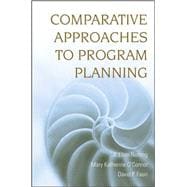
Note: Supplemental materials are not guaranteed with Rental or Used book purchases.
Purchase Benefits
What is included with this book?
F. Ellen Netting, PHD, is the Samuel S. Wurtzel Endowed Chair and Professor of Social Work at Virginia Commonwealth University where she teaches in the PhD, MSW, and BSW programs.
Mary Katherine O'Connor, PHD, is a Professor in the School of Social Work at Virginia Commonwealth University where she teaches in the PhD and MSW programs.
David P. Fauri, PHD, is a Professor of Social Work at Virginia Commonwealth University where he teaches in the PhD, MSW, and BSW programs.
| Differences Between Lines And Circles | |
| Lines and Circles as Planning Metaphors | |
| A Brief History of Lines & Circles | |
| Science and Reason | |
| Positivism vs | |
| Interpretivism | |
| Rational and Nonrational Thought | |
| Rational & Nonrational Problem-Solving and Decision-Making | |
| Planning Theory (Both Lines and Circles) | |
| Examples of Planning Approaches | |
| The "Surety" of the Line and the "Tentativeness" of the Circle | |
| A Conceptual Framework | |
| Summary | |
| Discussion Questions | |
| Programs -- Containers For Idea Implementation | |
| Programs and Projects | |
| Services and Interventions | |
| Programs and Projects | |
| Services and Interventions | |
| Programs in Organizational Context | |
| Program Planning | |
| Mandates & Initiatives | |
| Planning Different Types of Programs | |
| Summary | |
| Discussion Questions | |
| Rational Planning And Prescriptive Approaches | |
| Case: The Mayor and the Street Educators | |
| Introduction | |
| History of Rational Planning and Prescriptive Approaches | |
| Dimensions of Rational Planning and Prescriptive Approaches | |
| The Logic Model | |
| Assessing Needs | |
| Defining and Analyzing Problems | |
| Selecting Intervention Strategies | |
| Writing Goals and Objectives | |
| Program Design and Decision-Making | |
| Accountability in a Prescriptive Approach | |
| Accountability Challenges | |
| Information Systems | |
| Budgeting | |
| Rational Planning | |
| Mind Sets | |
| Skills | |
| Strengths and Challenges of Rational Planning | |
| Summary | |
| Discussion Questions | |
| Interpretive Planning And Emergent Approaches | |
| Case: The Invisible People and the Area Agency on Aging | |
| Introduction | |
| History of Interpretive Planning and Emergent Approaches | |
| Dimensions of Interpretive Planning and Emergent Approaches | |
| The Logic of Emergence | |
| Engagement | |
| Discovery | |
| Sensemaking | |
| Unfolding | |
| Accountability in an Emergent Approach | |
| Accountability Challenge | |
| Accountability Options | |
| Interpretive Planning | |
| Mind Sets | |
| Skills | |
| Strengths and Challenges of Interpretive Planning | |
| Summary | |
| Discussion Questions | |
| Knowing When To Use What Planning Approach | |
| An Example: AIDS Orphans and the Pig Intervention | |
| Similarities in Planning Approach Challenges | |
| Gaining Entry | |
| Becoming Oriented | |
| Engaging in Critical Thinking | |
| Making Ethical Decisions | |
| Comparing Program Planning Approaches | |
| Comparing Dimensions | |
| Examining Accountability | |
| Thinking about Mindsets and Skills | |
| Decision Issues for Approach Selection | |
| Summary | |
| Discussion Questions | |
| Appendix | |
| Program Planning In Diverse Cultural Contexts | |
| Culture and Context | |
| Defining Culture | |
| Elements in Culture Development | |
| Cultural Competence | |
| Skills of the Culturally Competent | |
| Challenges to Culturally Competent Human Service Programming | |
| Understanding Empiricism | |
| Recognizing Realism and Rationalism | |
| Responding to Accountability Demands | |
| Cultural Competence and Program Planning | |
| Planning with Sensitivity to Difference | |
| Differences within the Mainstream.& | |
| Within-Group Differences | |
| Planning with Sensitivity to Inclusion | |
| Planning with Sensitivity to Context | |
| Planning Across Multiple Organizational Settings | |
| Issues when Practicing Internationally | |
| Conclusion | |
| Exercises | |
| Glossary | |
| References | |
| Index | |
| Table of Contents provided by Publisher. All Rights Reserved. |
The New copy of this book will include any supplemental materials advertised. Please check the title of the book to determine if it should include any access cards, study guides, lab manuals, CDs, etc.
The Used, Rental and eBook copies of this book are not guaranteed to include any supplemental materials. Typically, only the book itself is included. This is true even if the title states it includes any access cards, study guides, lab manuals, CDs, etc.